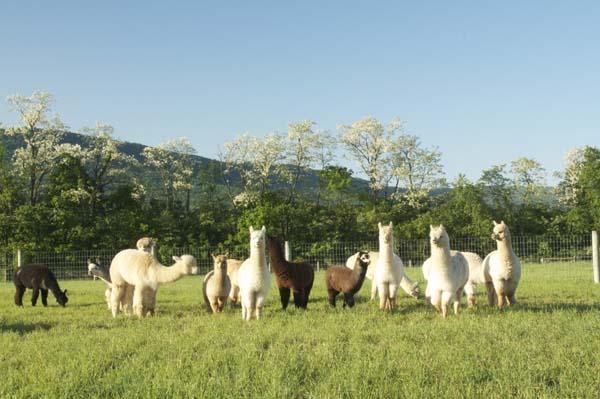Spring is HERE!
 Tiger Woods has won the Masters!
Tiger Woods has won the Masters!
Futurity Auction prices are up—average Huacaya prices $14,800!
People are outraged over news reports of single alpacas as pets!
Spring is here…finally. And with it, I recently talked with two leaders in the US alpaca industry and found many good things happening in the alpaca world.
Stacie Chavez, Imperial Yarn, states alpaca is having a moment. She doesn’t know how long it will last, but she has the same feeling she had almost 20 years ago when she entered the world of jewelry design and sales. “We were located in the SW and Turquoise was having a moment, the demand was HUGE. I wondered how long it would last, the answer: it's still in demand...it has become a staple stone in the jewelry world. I believe alpaca to be a durable market product, but now we have American Alpaca.”
Chris Riley, NEAFP, when asked if he thinks there is more interest in your product/service in 2019 responded “Definitely! The demand for our U.S. Alpaca products and fiber coming in for processing continue to grow year after year. All indicators from Q1 of 2019 show us that 2019 will be another banner year for the fiber pool and participating farms. Farms across the country continue to grow the retail side of their fiber business, and it's great to see them become more and more successful. “
NEAFP is also experiencing an increase in sales this year. “Alpaca farms across the country have grown their sales of NEAFP products by over 35% in the first 4 months of 2019 which is a promising start. The "busy" retail season with U.S. Alpaca tends to be in the Fall and Winter months, particularly around the holidays, so it's an excellent indicator of the sales year when our typically slower seasons are growing as well.” They accredit this to farms having more established and mature retail businesses, bringing on more products that help them capitalize on the building brand equity of alpacas themselves, and producing a more extensive range of alpaca products that have year-round sales cycles. Sales are up from almost any way you want to measure them; Dollar Value, Number of Orders, Value of orders, Repeat Orders and New Orders. Last year they implemented a customer loyalty program as a way of showing appreciation. “Initially, there were only a few customers at the top tier, now it is pretty crowded up there. That's great news for everyone.”
Imperial Yarn also saw a huge increase in sales in two of their hand knitting yarns. Denali, a sport weight alpaca wool blend has experienced strong sales and restocking locally. Paisley, an alpaca cotton blend was launched last year, and they had to do a large respin on Denali yarn, and now they are looking at their Paisley yarn and not only restocking but also adding a few colors.
I also asked about new projects for 2019. Here’s what Chris Riley had to say. “Certainly! We always try to have several irons in the fire in any given year. Our focus in recent years is to continually scale up production and bring in more domestic manufacturers to our network to help stay ahead of growing product demand.” On top of ramping up production on their existing product lines, they are always focused on prototyping for new products as everyone always wants to know "what's new?" Their latest projects consist of items that help farms take advantage of the growing alpaca brand as well as items that have year-round sales cycles. NEAFP also have begun offering something they call "Homegrown Products" which are custom manufacturing runs for larger farms and regional breed organizations who want to produce an exclusive product made out of their regionally grown fiber.
NEAFP is also working on a climate beneficial wool project where they think alpaca farms will have an important role to play. Pasture benefit the environment by absorbing greenhouse gasses. Animals that eat pasture to produce a valuable product (fiber for cloths) help the environment. NEAFP is working to see how alpaca can play a roll in this exciting frontier.
Imperial Yarn was purchased 3 1/2 years ago as a wool company, and since that time, they have been adding more products with alpaca as the showcased fiber. This year they are ordering larger quantities, so they are stocked and ready for selling for AFD's and the fall selling season. Imperial Yarn is on a slow and steady climb. As Stacie commented, "What will the future bring, I don't know, but I know my phone is ringing a lot more.”
One crucial indicator of progress within our industry is the changing view of alpaca as livestock trend. I find it interesting that people are outraged over alpacas as pets. There has been an internet backlash of alpaca owners that are appalled with single animal purchases and raising alpacas in homes. This is good news for our market and our future. Raising alpaca as livestock doesn’t mean we care for our alpacas any less…it implies that we are experiencing a refocus of the alpaca business model within our standard farming practices. Alpacas don’t have to be pets to be tended to and raised affectionately. It’s a concept that farmers have practiced for generations. Here’s hoping we continue to see growth and that we have a prosperous second generation of alpaca farmers in the US.
Happy Easter and Passover
